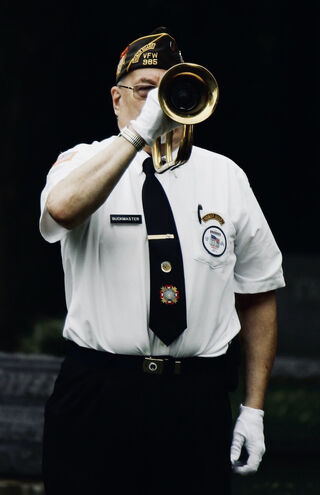Anxiety
To Wage War Against Performance Anxiety
Consider going guerrilla in the fight for your musical life.
Posted July 7, 2020

Often in the past when advising musicians about dealing with stage fright, I’ve encouraged them to try to conceive of performance as a simple sharing of expression with fellow human beings who are largely predisposed to enjoy it. The symptoms of anxiety result when the body activates its emergency system, the sympathetic branch of the autonomic nervous system, more commonly called the “fight or flight” response. This is triggered when a person perceives a threat.
In the case of a real physical threat, the bodily responses are positive and adaptive—they help the person deal with the threat—but when the threat is more imagined or psychological, the responses are felt as anxiety and are disruptive. So I’ve often said that if musicians perceive performance as a threat, they’ve already lost the battle of anxiety.
I think this is a constructive and empowering perspective to take. I have, however, refrained from offering it to musicians who present to me the scenario of an audition, graded jury, or other overtly evaluative performance situation that will have very real consequences in their lives.
What is the best mindset to have in such situations? With highly consequential performances, there can be a very real threat to musicians: to their musical self-esteem, to their livelihood, and to their access to future musical opportunities. In other words, what should they do when “fight or flight” is a reasonable response?
I’ve thought on this for a while and some time ago, I concluded that regardless of the specifics of a musician’s performance anxiety, “flight” is not a useful response. Flight means avoiding performance. But as I have written about elsewhere, the harsh irony of performance anxiety is that, although it often motivates musicians to perform less, overcoming it ultimately involves performing more (Woody, 2019).
So I suppose I settled on fight as the response for truly threatening performance situations, but I’ve since found it extremely challenging to address what it means to musically fight musically. I gained some insight into this recently when I came across a podcast episode about soldiers in battle. Granted the episode had nothing to do with music, but when it analytically covered the topic of battle, I couldn’t help but look for applications to musicians’ fight against performance anxiety.
The episode, featuring military historian Michael Stephenson, was part of the Art of Manliness podcast. Just in case the word “manliness” conjures up ideas of an outdated, chauvinist machismo, I assure you the podcast is not like that. Although the show does sometimes cover stereotypical manly things like job success and grilling steaks (and host Brett McKay does sport a mustache that would make Ron Swanson and 1980s Magnum, PI proud!), I've found the podcast to be very enlightened and enlightening. For my part, I am not much of a military or fight guy, certainly in terms of personal experience (and I never liked the movie Gladiator as much as my friends seemed to). When I do find myself thinking about military matters—perhaps when I talk to a friend or relative who's served or I've seen a war movie like 1917 or Saving Private Ryan—I come away from it simultaneously appreciating the sacrifice of service members and disappointed in humanity for too often having to turn to armed conflict to deal with matters.
I suppose it’s not surprising that when I hear a podcast about soldiers in battle, I focus on applying it to musicians’ war against stage fright. I was particularly interested in what the military historian had to say about ambush warfare or guerrilla tactics. Apparently battlers have chosen to use this approach when they found themselves facing a stronger or better-armed opponent. I find this fitting for musicians who feel “outgunned” in an intimidating performance situation. They take the stage equipped only with their music, and may literally face a panel of judges armed with unfriendly facial expressions, critical words, and the full weight of their consequential judgments about the performance. In genuinely threatening situations like this, what can performers to avoid being overwhelmed and defeated by their foe?
The defining characteristic about guerrilla fighters is that they operate in irregular ways. Borrowing from this approach in their performance, musicians may want to do something unexpected. Often with auditions or juries, musicians are informed of the minimum requirements for their performance. They can do the unexpected by preparing a performance that obviously exceeds the minimum or, if that’s not possible, meets the minimum in a creative way.
Military history has indicated that often European aggressors in war despised guerrilla warfare because their opponents did not observe their culturally valued “rules“ of war (such as approaching their army from the front in full sight). Perhaps musicians can gain a sense of control and self-determination by deliberately disregarding a convention that is usually—and unthinkingly—observed. I certainly would not recommend doing something that will be perceived as disrespectful or antagonistic to the panel of judges hearing the performance, but there are many conventions that have become commonplace in certain musical cultures that, at the heart of it, are not that crucial to the music.
Also, when looking for ways to do something unexpected, or a convention to flout, perhaps the best place for musicians to look is an inventory of their personal performance strengths. After all, the point of guerrilla warfare is to gain an advantage over the opponent. Instead of being concerned only about what the judges want or expect you to do, you can assert yourself by choosing to do what you want or what you do best.
My battle analogy for performance holds up with a recent research study that examined the pre-performance emotions and performance anxiety beliefs of young musicians (Kaleńska-Rodzaj, 2020). Based on her findings, the researcher likened the fight response to courage, i.e., persisting in spite of fear. She recommended that performers’ lack of confidence be interpreted as a state of mobilization—a military term—which should prompt them to focus on their “readiness to complete an important task despite the uncertainty and limited control over the environment” (p. 87).
I maintain that all musicians, young and old, would do well to think of music-making as a naturally human sharing of expression. And in situations when a performance is especially consequential and, as such, is legitimately threatening, they should try to remember that it is natural to feel fear when threatened. That is when courage is a useful response; applying it productively should prompt them to do whatever they can to empower themselves to in an anxiety-inducing performance situation.
Copyright 2020 Robert H. Woody.
References
Kaleńska-Rodzaj, J. (2020). Pre-performance emotions and music performance anxiety beliefs in young musicians. Research Studies in Music Education, 42(1) 77-93. DOI: 10.1177/1321103X19830098
Woody, R. H. (2019). Becoming a real musician: Inspiration and guidance for teachers and parents of musical kids. Lanham, MD: Rowman & Littlefield.




